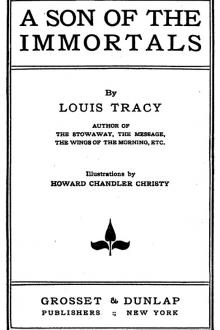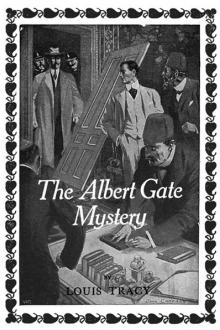author - "Louis Tracy"

e that?"
"You have chosen the only good bit in the painting," he declared stoutly. "Look at the boy's lips. Caravaggio must have modeled them from a girl's. What business has a fellow with pouting red lips like them to wear a sword on his thigh?"
Joan laughed with joyousness that was good to hear.
"Pooh! Run away and smite that ball with a long stick!" she said.
"Hum! More than the Italian could have done."
He was ridiculously in earnest. Joan colored suddenly and busied herself with tubes of paint. She believed he was jealous of the handsome Lombard. She began to mix some pigments on the palette. Delgrado, already regretting an inexplicable outburst, turned from the picture and looked at Murillo's "woman clothed with the sun, and the moon under her feet, and upon her head a diadem of twelve stars."
"Now, please help me to appreciate that and you will find me a willing student," he murmured.
But Joan had recovered her self-possession. "Suppose we come off the h

the spacious chamber, stood a group that arrested the eye-a Spanish priest, in vestments of semi-state; an olive-skinned man whom Maseden recognized as a legal practitioner of fair repute in a community where chicanery flourished, and a slenderly-built woman of middle height, though taller than either of her companions, whose stylish coat and skirt of thin, gray cloth, and smart shoes tied with little bows of black ribbon, were strangely incongruous with the black lace mantilla which draped her head and shoulders, and held in position a double veil tied firmly beneath her chin.
Maseden was so astonished at discovering the identity of the lawyer that he momentarily lost interest in the mysterious woman who would soon be his wife.
"Señor Porilla!" he cried. "I am glad you are here. Do you understand--"
"It is forbidden!" hissed Steinbaum. "One more word, and back you go to your cell!"
"Oh, is that part of the compact?" said Maseden cheerfully. "Well, well! We must not make ma

ained that you had a vivid dream, in which you saw your cousin stabbed by a stranger whom you did not know, whose face even you never saw. Sir Alan was undoubtedly murdered. The dagger-like attachment to your Japanese sword had been driven into his breast up to the hilt, actually splitting his heart. To deliver such a blow, with such a weapon, required uncommon strength and skill. I think I describe it here as 'un-English.'"
Brett referred to his scrap-book. In spite of himself, he felt all his old interest reawakening in this remarkable crime.
"Yes?" queried Hume.
The barrister, his lips pursed up and critical, surveyed his concluding notes.
"You were tried at the ensuing Assizes, and the jury disagreed. Your second trial resulted in an acquittal, though the public attitude towards you was dubious. The judge, in summing up, said that the evidence against you 'might be deemed insufficient.' In these words he conveyed the popular opinion. I see I have noted here that Miss Margaret H

most remarkable affair I have ever been engaged in. That pleases me. Pheasant-shooting is a serious business, governed by the calendar and arranged by the head-keeper."
An electric bell summoned Smith. The barrister handed him the telegram and a sovereign.
"Read that message," he said. "Ponder over it. Send it, and give the change of the sovereign to Mrs. Smith's brother, with my compliments and regrets."
CHAPTER II
MEHEMET ALI'S NOTE
Then he turned to Lord Fairholme.
"Just one question," he said, "before I send you off to bed. No, you must not protest. I want you to meet me here this evening at seven, with your brain clear and your nerves restored by a good, sound sleep. We will dine, here or elsewhere, and act subsequently. But at this moment I want to know the name of the person most readily accessible who can tell me all about Mr. Talbot's connection with the Sultan's agent."
"His sister, undoubt

Bruce read:
"I opened your message. Alice not here. I have not seen her for over a week. What do you mean by wire? Am coming to town at once.--EDITH."
The baronet's pale face and strained voice betrayed the significance of the thought underlying the simple question.
"What do you make of it, Claude?"
Bruce, too, was very grave. "The thing looks queer," he said; "though the explanation may be trifling. Come, I will help you. Let us reach your house. It is the natural centre for inquiries."
They hailed a hansom and whirled off to Portman Square. They did not say much. Each man felt that the affair might not end so happily and satisfactorily as he hoped.
CHAPTER II
INSPECTOR WHITE
Lady Dyke had disappeared.
Whether dead or alive, and if alive, whether detained by force or absent of her own unfettered volition, this handsome and well-known leader of Society had vanished utterly from the moment when Cl

e that?"
"You have chosen the only good bit in the painting," he declared stoutly. "Look at the boy's lips. Caravaggio must have modeled them from a girl's. What business has a fellow with pouting red lips like them to wear a sword on his thigh?"
Joan laughed with joyousness that was good to hear.
"Pooh! Run away and smite that ball with a long stick!" she said.
"Hum! More than the Italian could have done."
He was ridiculously in earnest. Joan colored suddenly and busied herself with tubes of paint. She believed he was jealous of the handsome Lombard. She began to mix some pigments on the palette. Delgrado, already regretting an inexplicable outburst, turned from the picture and looked at Murillo's "woman clothed with the sun, and the moon under her feet, and upon her head a diadem of twelve stars."
"Now, please help me to appreciate that and you will find me a willing student," he murmured.
But Joan had recovered her self-possession. "Suppose we come off the h

the spacious chamber, stood a group that arrested the eye-a Spanish priest, in vestments of semi-state; an olive-skinned man whom Maseden recognized as a legal practitioner of fair repute in a community where chicanery flourished, and a slenderly-built woman of middle height, though taller than either of her companions, whose stylish coat and skirt of thin, gray cloth, and smart shoes tied with little bows of black ribbon, were strangely incongruous with the black lace mantilla which draped her head and shoulders, and held in position a double veil tied firmly beneath her chin.
Maseden was so astonished at discovering the identity of the lawyer that he momentarily lost interest in the mysterious woman who would soon be his wife.
"Señor Porilla!" he cried. "I am glad you are here. Do you understand--"
"It is forbidden!" hissed Steinbaum. "One more word, and back you go to your cell!"
"Oh, is that part of the compact?" said Maseden cheerfully. "Well, well! We must not make ma

ained that you had a vivid dream, in which you saw your cousin stabbed by a stranger whom you did not know, whose face even you never saw. Sir Alan was undoubtedly murdered. The dagger-like attachment to your Japanese sword had been driven into his breast up to the hilt, actually splitting his heart. To deliver such a blow, with such a weapon, required uncommon strength and skill. I think I describe it here as 'un-English.'"
Brett referred to his scrap-book. In spite of himself, he felt all his old interest reawakening in this remarkable crime.
"Yes?" queried Hume.
The barrister, his lips pursed up and critical, surveyed his concluding notes.
"You were tried at the ensuing Assizes, and the jury disagreed. Your second trial resulted in an acquittal, though the public attitude towards you was dubious. The judge, in summing up, said that the evidence against you 'might be deemed insufficient.' In these words he conveyed the popular opinion. I see I have noted here that Miss Margaret H

most remarkable affair I have ever been engaged in. That pleases me. Pheasant-shooting is a serious business, governed by the calendar and arranged by the head-keeper."
An electric bell summoned Smith. The barrister handed him the telegram and a sovereign.
"Read that message," he said. "Ponder over it. Send it, and give the change of the sovereign to Mrs. Smith's brother, with my compliments and regrets."
CHAPTER II
MEHEMET ALI'S NOTE
Then he turned to Lord Fairholme.
"Just one question," he said, "before I send you off to bed. No, you must not protest. I want you to meet me here this evening at seven, with your brain clear and your nerves restored by a good, sound sleep. We will dine, here or elsewhere, and act subsequently. But at this moment I want to know the name of the person most readily accessible who can tell me all about Mr. Talbot's connection with the Sultan's agent."
"His sister, undoubt

Bruce read:
"I opened your message. Alice not here. I have not seen her for over a week. What do you mean by wire? Am coming to town at once.--EDITH."
The baronet's pale face and strained voice betrayed the significance of the thought underlying the simple question.
"What do you make of it, Claude?"
Bruce, too, was very grave. "The thing looks queer," he said; "though the explanation may be trifling. Come, I will help you. Let us reach your house. It is the natural centre for inquiries."
They hailed a hansom and whirled off to Portman Square. They did not say much. Each man felt that the affair might not end so happily and satisfactorily as he hoped.
CHAPTER II
INSPECTOR WHITE
Lady Dyke had disappeared.
Whether dead or alive, and if alive, whether detained by force or absent of her own unfettered volition, this handsome and well-known leader of Society had vanished utterly from the moment when Cl